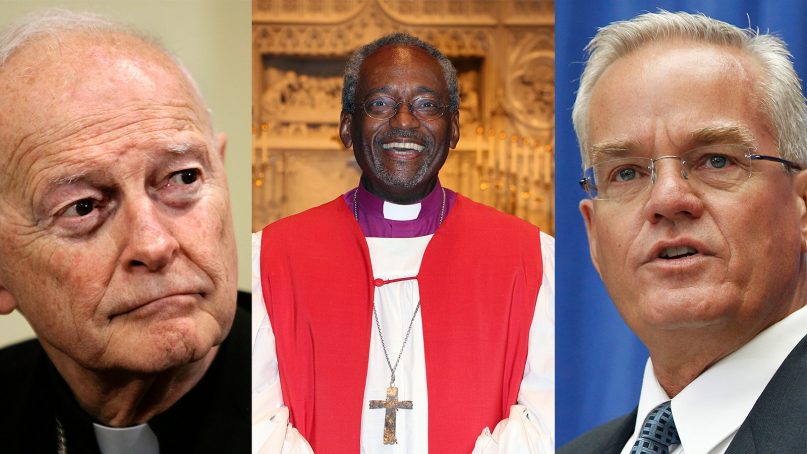(RNS) — A year ago Bill Hybels was the well-respected pastor of one of the most influential megachurches in the nation. Theodore McCarrick was a prince of the Catholic Church, and Michael Curry was the relatively unknown head of a mainline Protestant denomination.
What a difference a year makes.
In April, Hybels stepped down from Willow Creek Community Church after being accused of years of sexual harassment and misconduct. Hybels denied the allegations. But the suburban Chicago church — after initially defending him — called his behavior sinful. Eventually, Hybels’ successors and all the church’s elders resigned, leaving the church with a $3.3 million budget deficit and an uncertain future.
In July, McCarrick was forced to resign from the College of Cardinals and was ordered by Pope Francis to lead a “life of prayer and penance” after being accused of sexually assaulting a minor four decades ago. McCarrick was also accused of sexually harassing seminarians for years.
Meanwhile, Curry skyrocketed to international fame after nearly 2 billion people tuned in to a royal wedding and heard his sermon, “The Power of Love.”
“I’m talking about power,” he said as Prince Harry and Duchess Meghan Markle — and a global audience — listened. “Real power. Power to change the world.”
That sermon made Curry perhaps the best-known Protestant clergyman on the planet and earned him recognition as the “Religion Newsmaker of the Year,” according to the Religion News Association.
The popularity of Curry’s sermon was a testament to the enduring power of religion in a year full of tumult in the world of faith, as it was elsewhere.
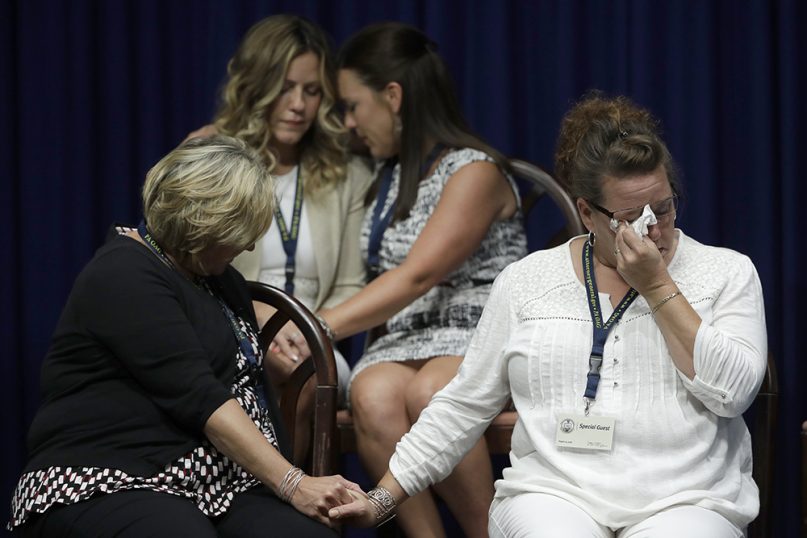
Victims of clergy sexual abuse, or their family members, react as Pennsylvania Attorney General Josh Shapiro speaks during a news conference at the Pennsylvania Capitol in Harrisburg on Aug. 14, 2018. A Pennsylvania grand jury’s investigation of clergy sexual abuse identified more than 1,000 child victims. The grand jury report said that number came from records in six Roman Catholic dioceses. (AP Photo/Matt Rourke)
Catholics across the country were shaken by the release of a scathing report from a Pennsylvania grand jury, detailing the abuse of more 1,000 children by 301 priests in six dioceses over 70 years. That report reignited the church’s long-running abuse scandal and led dioceses across the country to open their files and reveal the names of priests accused of abuse.
In the wake of the grand jury report, Cardinal Donald Wuerl, archbishop of Washington and an ally of Francis, resigned. Wuerl had been criticized for his handling of abuse claims when he was archbishop of Pittsburgh in the 1980s and ’90s.
“I am sorry and ask for healing for all of those who were so deeply wounded at the hands of the Church’s ministers,” Wuerl wrote in a letter announcing his resignation. “I also beg forgiveness on behalf of Church leadership from the victims who were again wounded when they saw these priests and bishops both moved and promoted.”
Protestant churches and other religious groups also dealt with sexual harassment and abuse scandals in 2018 as survivors of abuse and harassment spoke out against powerful religious leaders.
Among them was Jules Woodson, who confronted Memphis, Tenn., megachurch teaching pastor Andy Savage in an email about an incident that occurred in the late 1990s, when he was a youth pastor and she was a teenager. Woodson claimed Savage sexually assaulted her, while he claimed their relationship was consensual. When he penitently confessed at a Sunday service in January, the congregation gave Savage a standing ovation, sparking outrage. He later resigned, followed by the church’s teaching pastor.
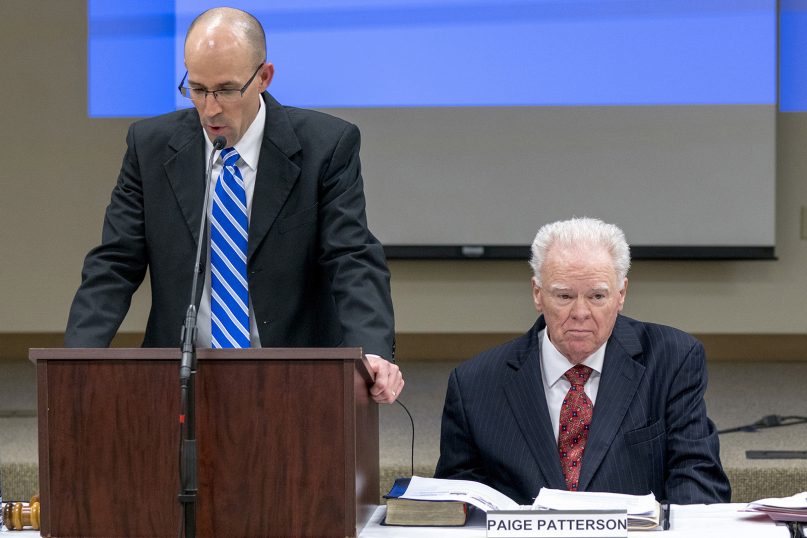
Southwestern Baptist Theological Seminary trustee chairman Kevin Ueckert, left, addresses trustees at a special called meeting at the Fort Worth, Texas, campus on May 22, 2018. The board met to discuss the recent controversies surrounding seminary President Paige Patterson, right, who was eventually fired. Photo by Adam Covington/SWBTS
In June, Paige Patterson, one of the architects of the conservative resurgence that took over the Southern Baptist Convention beginning in the late 1970s, was fired as president of Southwestern Baptist Theological Seminary for mishandling sexual assault claims. While leading another Baptist seminary in 2003, according to an alleged rape victim, he disregarded her accusation of a fellow student.
Patterson was also chastised for repeatedly making insensitive comments about women, including claiming that he told a woman to return to her abusive husband.
Rachael Denhollander, a former gymnast whose testimony helped convict former USA Gymnastics team doctor Larry Nassar for decades of abuse, said her faith caused her to both confront and forgive her abuser. Nassar eventually was sentenced to up to 175 years in prison.
“I pray you experience the soul-crushing weight of guilt,” she told Nassar, “so you may someday experience true repentance and true forgiveness from God, which you need far more than forgiveness from me — though I extend that to you as well.”
Religion also played a major role in the confirmation hearings of U.S. Supreme Court Justice Brett Kavanaugh, who was accused of sexual assault that allegedly occurred when he was a high school student. Some faith-based groups called on senators to reject Kavanaugh based on the allegations, while others rallied to his defense.
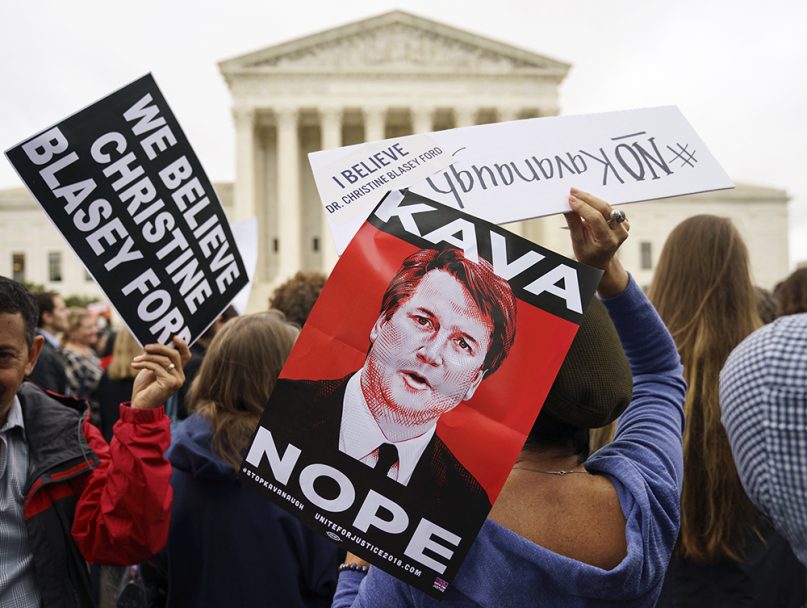
Protesters gather in front of the Supreme Court building holding signs with the image of Judge Brett Kavanaugh that read “Kava Nope” and “We Believe Christine Blasey Ford” on Capitol Hill in Washington, D.C., on Sept. 24, 2018. (AP Photo/Carolyn Kaster)
Allegations of sexual misconduct also led to the firing of David Silverman, the popular president of American Atheists, a leading secular organization.
The past year also saw a wave of religious-linked violence and repression around the world. In Yemen, a war between rebels backed by Shiite Muslim leaders in Iran and the government backed by the Sunni government of Iraq led to one of the world’s worst humanitarian crises.
A deadly attack on the Tree of Life synagogue in Pittsburgh in October left 11 worshippers dead. The mass shooting, deemed the deadliest anti-Semitic attack in U.S. history, came amid a growing wave of anti-Semitism in the United States and Europe.
In China, as many as a million Uighurs, members of a mostly Muslim minority group, have been rounded up and detained in secret internment camps, labeled “vocational training centers.” Chinese officials have been accused of trying to erase the Uighurs’ culture and religion.
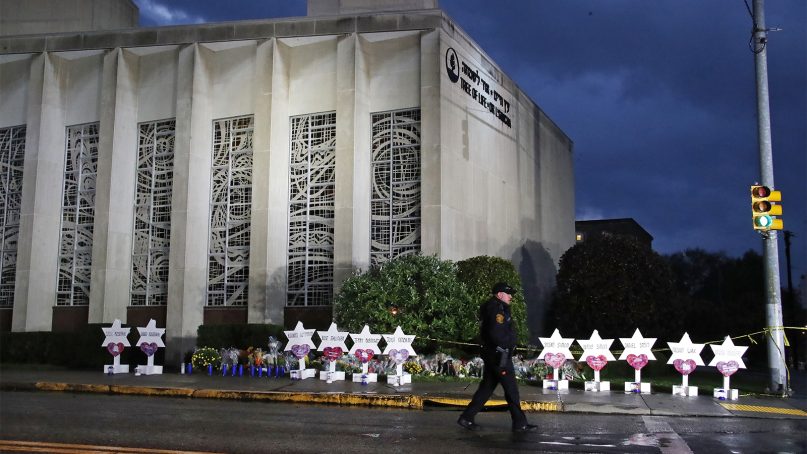
A Pittsburgh police officer patrols around the Tree of Life synagogue and a memorial of flowers and Stars of David in Pittsburgh on Oct. 28, 2018, in remembrance of those killed and injured when a shooter opened fire during services at the synagogue. (AP Photo/Gene J. Puskar)
Among the other top stories from 2018:
- Billy Graham, famed evangelical preacher and spiritual adviser to U.S. presidents, died at 99. His evangelistic crusades filled stadiums around the globe for decades, and even in retirement, he remained one of the most admired people in America.
- The U.S. Supreme Court ruled that the so-called “Muslim ban,” which bars travel from a number of Muslim-majority countries, is legal. The ban is part of a larger Trump administration policy to limit the number of refugees and immigrants allowed into the U.S.
- The Supreme Court also sided with Jack Phillips, a Colorado baker who refused to make a wedding cake for a same-sex couple. The court ruled that Colorado officials discriminated against Phillips based on religion. But the decision did not end Phillips’ legal woes: He recently appeared in court again in another discrimination case.
- Religious leaders helped lead opposition to a Trump administration family separation policy at the border.
- The Church of Jesus Christ of Latter-day Saints announced it would no longer welcome the term “Mormon.” Church President Russell M. Nelson said the name change was God’s will. “To remove the Lord’s name from the Lord’s Church is a major victory for Satan,” he told church members.
- During the 2018 midterm elections, Ilhan Omar and Rashida Tlaib became the first Muslim women elected to Congress.
- A Turkish judge freed Andrew Brunson, an American pastor who had been jailed for two years after being accused of being a spy and conspiring against the Turkish government.
- Asia Bibi, a Pakistani woman sentenced to death for blasphemy, was freed after Pakistan’s highest court threw out her conviction. Her acquittal led to riots and calls for her death. She remains in hiding.
- American missionary John Allen Chau was killed while trying to contact an indigenous people group on North Sentinel Island in the Bay of Bengal. Indian officials said Chau’s attempt to contact the Sentinelese was illegal. Critics of Chau said he was misguided, while supporters called him a martyr.
- Commemorations of the 50th anniversary of the death of the Rev. Martin Luther King Jr. led to renewed calls to address the ongoing legacy of racism in the U.S. During one event, held by Southern Baptists and other conservative groups in Memphis, news broke that a white Baptist church was expelled from its local association for racism. That church eventually became the first church removed from the Southern Baptist Convention for racism.
- James Cone, a famed theologian known as the founder of black liberation theology, died at 79.
- Eugene Peterson, whose Bible paraphrase known as “The Message” sold millions of copies, died at 85. Known as a pastor to pastors, Peterson was an author, theologian and preacher. Among his last words were “Let’s go.”
- American Zen master Roshi Bernie Glassman died at 79.
